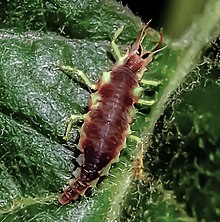Chrysoperla rufilabris

| Chrysoperla rufilabris | |
|---|---|
 | |
| Scientific classification | |
| Domain: | Eukaryota |
| Kingdom: | Animalia |
| Phylum: | Arthropoda |
| Class: | Insecta |
| Order: | Neuroptera |
| Family: | Chrysopidae |
| Tribe: | Chrysopini |
| Genus: | Chrysoperla |
| Species: | C. rufilabris |
| Binomial name | |
| Chrysoperla rufilabris (Burmeister, 1839) | |
| Synonyms[1] | |
| |
Chrysoperla rufilabris, also known as the red-lipped green lacewing, is a species of green lacewing in the family Chrysopidae.[2][3]
Distribution
[edit]This species is native to the eastern portion of North America.[3][4]
Description
[edit]
C. rufilabris are distinguished from other members of the genus found in North America by the broadly red genae, pointed apex of the fore wing, black gradate crossveins, and spinellae on the male genitalia.[4]
Biology
[edit]The larvae of this species prey upon soft-bodied insects including aphids, thrips, and whiteflies.[5][6]
References
[edit]- ^ Oswald, John D. (Jul 2018). "Chrysoperla rufilabris (Burmeister, 1839) in Neuropterida Species of the World". Lacewing Digital Library. Retrieved 7 May 2020.
- ^ Hoskins, Jonathan W.; Maxwell, John R.; Belov, Vassili; Gould, Anita; Kropiewnicki, Ted. "Chrysoperla rufilabris species Information". BugGuide.net. Retrieved 2019-09-24.
- ^ a b Penny, Norman D.; Adans, Phillip A.; Stange, Lionel A. (1997). "Species catalog of the Neuroptera, Megaloptera and Raphidioptera of America north of Mexico". Proceedings of the California Academy of Sciences. Fourth Series. 50: 39–114.
- ^ a b Brooks, S.J. (1994). "A taxonomic review of the common green lacewing genus Chrysoperla (Neuroptera: Chrysopidae)" (PDF). Bulletin of the Natural History Museum, Entomology Series. 63 (2): 137–210. Retrieved 7 May 2021.
- ^ Schuster, David J.; Stansly, Philip A. (2000). "Response of two lacewing species to biorational and broad-spectrum insecticides". Phytoparasitica. 28 (4): 297–304. doi:10.1007/BF02981824. S2CID 42225759.
- ^ Khan, I.; Morse, J.G. (1999). "Laboratory studies on the evaluation of Chrysoperla spp. as predators of citrus thrips". Sarhad Journal of Agriculture. 15 (5): 459–465.
External links
[edit] Media related to Chrysoperla rufilabris at Wikimedia Commons
Media related to Chrysoperla rufilabris at Wikimedia Commons